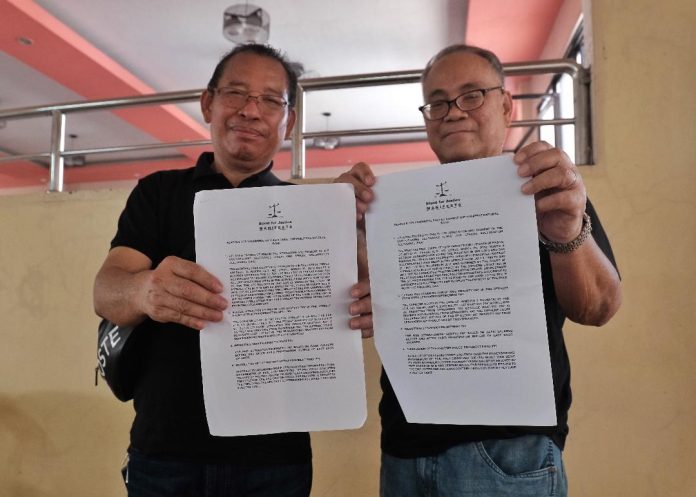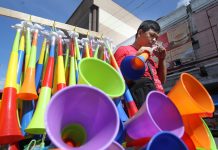
Retirees of the Philippine National Bank-Davao branch (PNB-Davao) joined the nationwide prayer rally against the bank on Tuesday.
The group commenced the activity with a Holy Mass at San Pedro Cathedral’s Adoration Chapel on Tuesday morning.
Lawyer Tom Sentillas, former regional lawyer of PNB-Davao, cited two major issues that their group is fighting: payment of the Cost of Living Allowance (COLA) and the Special Amelioration Allowance (SAA).
Sentillas, who was employed by PNB-Davao for 25 years from 1983 to 2008 told Edge Davao that they are demanding PNB to pay their COLA and SAA from the period of 1989 to 1996 or seven years.
“Being with the government sauna nagadawat mi ug COLA ug SAA. Pero katong na implement na ang standardization law, gi stop ang pagbayad sa PNB. Allegedly on the basis of the Department of Budget and Management (DBM) Corporate Compensation Circualr No. 10 nga gaingon na ipaundang ang pagpabayad. But it turned out later na katong DBM Circular No. 10 was ineffective tungod kay wala na publish sa official gazette or any newspaper of general circulation,” he said.
Sentillas said that PNB should have continued to pay their COLA and SAA. But PNB failed to pay them the reason why they decided to file a case against the bank.
He said that lawyer Goldelio Rivera represented the retirees in filing a case against PNB before the Regional Trial Court (RTC) of Pasay City.
Based on the group’s manifesto, RTC Pasay issued a decision ordering PNB to pay the back pay in the COLA and SAA equivalent to 40 percent and 10 percent respectively of the basic salaries of all employees who were in the service from July 1, 1989, to May 26, 1996.
The RTC’s decision in 2010 was affirmed by the Court of Appeals (CA) in 2016, which was affirmed by the Supreme Court (SC) on March 29, 2023.
Sentillas said PNB is allegedly using delaying tactics for the resolution of the case.
“Unta ang PNB kay napildi naman sila sa RTC, CA, ug SC nagbayad na lang unta sila. Hangtod karon wala sila nagbayad ug ang ilahang gihimo, nagfile sila ug Motion for Reconsideration ug Motion na i-remand ang kaso ngadto balik sa RTC. Mao na ang mga delaying tactics na gihimo sa PNB, mga postponement, dili muapil ug pre-trial conferences. We expect nga ang SC i-deny gihapon to ang ilang motion for reconsideration para mapwersa na ang PNB para magbayad,” he said.
The group also expressed concern about the illegal deduction by PNB of the Government Service Insurance System’s (GSIS’s) Gratuity Pay of PNB retirees from their separation/retirement pay.
The group’s manifest cited the SC in the case of Jumelito T. Dalmacio vs. PNB ruled that the “gratuity pay should not be deducted from separation pay because gratuity pay is distinct and separate from separation pay.”
It also stated that the SC declared that the act of PNB deducting gratuity pay from separation pay should not be countenanced.
Nicardo M. Leopoldo, for first vice president of PNB-Davao and employed for 35 years from 1973 to 2008, explained that this is due to the privatization of PNB.
PNB was established by the Government of the Philippines in 1916 and became fully privatized in 2007.
“Mao ni ang problema, the evil of privatization. Ang nahitabo sa pag privatize gi-considered mi nga resigned or terminated sa government service at that time for 22 years sa GSIS. Wala man kay mahimo kay mandatory man unya napugos mi pagdawat ug gratuity pay or pesion pero one time lang pero without pension. Pagdawat namo ana, walay pension ug pag retire namo, ang gatuity pay gi-deduct sa among retirement. So, my 22 years of service wala mi nadawat sa GSIS. Luoy kaayo ang PNB employees sa pag privatize kay walay nadawat sa GSIS unya ang Supreme Court nag-ingon karon naa namay decision na illegal ang pag deduct sa gratuity pay sa among retirement benefits,” he said.
Sentillas said after the rally they will wait for the action of PNB.
“Hopefully, mu-soften sila ug ila na lang bayran kay mga tigulang na biya mi mga retirees. Ug kung ma delay pa ug dugay basin dili na sila makaabot,” he said.
The rally was simultaneously staged in Manila, Zamboanga, Cebu, Bacolod, Iloilo, Davao and other major cities in the country.






